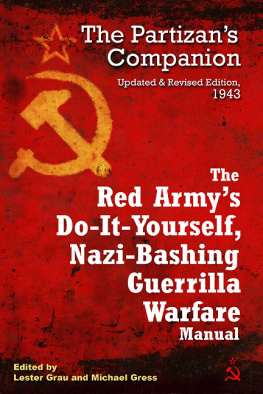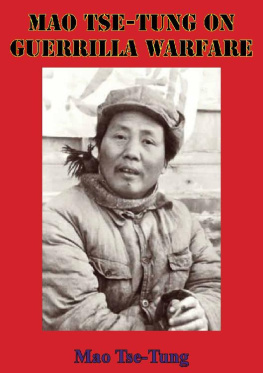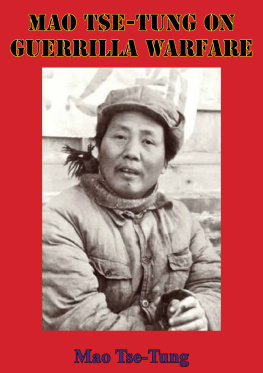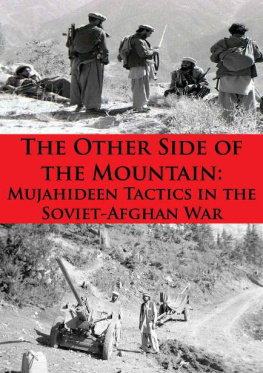AFGHAN
GUERRILLA WARFARE
In the Words of the Mujahideen Fighters
ALI AHMAD JALALI
LESTER W. GRAU
Foreign Military Studies Office, Fort Leavenworth, Kansas
Introduction by Lieutenant General John E. Rhodes
Commanding General, U.S. Marine Corps Combat
Development Command
Courtesy of the United States Marine Corps Studies and
Analysis Division, Quantico, Virginia

CONTENTS
INTRODUCTION
As we have throughout our historythe Philippines, Haiti, Nicaragua, Lebanon, Vietnam and SomaliaMarines will encounter guerrilla forces in the 21st century. Marines must understand potential adversaries, and learn as much as possible about them. The mujahideen of the Soviet-Afghan War prevailed against a larger and decisively better equipped foe, the Soviet Army. The Other Side of the Mountain presents the story of the mujahideens fight against that foe.
On 27 December 1979, Moscow ordered the Soviet Army into Afghanistan. Organized, equipped, and trained for the execution of combined arms operations, that force embodied the concept of blitzkrieg. Nine years later, it withdrew in defeat. The Other Side of the Mountain was written from the reports of mujahideen combat veterans and provides a tactical look at a decentralized army of foot-mobile guerrillas waging war against a technologically superior foe. Absolute supremacy of firepower did not guarantee victory. Native knowledge of terrain and detailed study of a known adversary offset that advantage. In particular, the chapter on urban combat will be of great interest to commanders concerned with force protection. This book and its companion volume, The Bear Went Over the Mountain: Soviet Combat Tactics in Afghanistan, published for the United States Marine Corps in 1996, offers a chronicle of the Afghan War by the warfighters.
The Marine Corps of the 21st century will have tremendous advantages over guerrilla forces. Our equipment, technology, training, and support are the best in the world. Yet, technological superiority is not in and of itself a guarantee of success. Insight into our adversarys capabilities, tactics and motivation will provide the decisive edge. The Other Side of the Mountain will help us gain this insight. I heartily recommend this book to all Marines.
J. E. RHODES
Commanding General
Marine Corps Combat
Development Command
FOREWORD
When the Soviet Union invaded Afghanistan in 1979, few experts believed that the fledgling Mujahideen resistance movement had a chance of withstanding the modern, mechanized, technologically-advanced Soviet Army. Most stated that resistance was futile and that the Soviet Union had deliberately expanded their empire to the south. The Soviet Union had come to stay. Although some historians looked at the British experience fighting the Afghan mountain tribesmen, most experts discounted any parallels since the Soviet Union possessed an unprecedented advantage in fire power, technology and military might. Although Arab leaders and the West supplied arms and material to the Mujahideen, they did so with the hope of creating a permanent, bleeding ulcer on the Soviet flank, not defeating the Soviet Union. They did not predict that the Soviet Union would voluntarily withdraw from Afghanistan in 1989.
What caused the Soviet withdrawal? The Soviets realized that they were trapped in an unwinnable war where they were suffering death from a thousand cuts by an intractable enemy who had no hope of winning, but fought on because it was the right thing to do. After failing to achieve military victory, the Soviet Union cut its losses and withdrew. The Soviet Union lost 13,833 killed. Over 1.3 million Afghans died and over a third of the population became refugees. Most have not yet returned to war-torn Afghanistan.
There have been few studies of guerrilla warfare from the guerrillas perspective. To capture this perspective and the tactical experience of the Mujahideen, the United States Marine Corps commissioned this study and sent two retired combat veterans to interview Mujahideen. The authors were well received and generously assisted by various Mujahideen who willingly talked about their long, bitter war. The authors have produced a unique book which tells the guerrillas story as interpreted by military professionals. This is a book about small-unit guerrilla combat. This is a book about death and survival, adaptation and perseverance.
This is a book for the combat-arms company and field grade officer and NCO. It provides an understanding of guerrilla field craft, tactics, techniques and procedures. It has application in Basic and Advanced Officer and NCO courses as well as special warfare courses. Senior leaders will also find valuable insights for training and supporting guerrilla forces as well as defending against guerrilla forces. This book is a companion piece to The Bear Went Over the Mountain: Soviet Combat Tactics in Afghanistan which National Defense University press published in 1996.
ACKNOWLEDGMENTS
This book would not be possible without the open, friendly and willing support of the many Mujahideen we interviewed. We thank Mawlawi Abdul-Rahman, Haidar Ahmadi, Mohammad Akbar, Akhtarjhan, Doctor Abdul Qudus Alkozai, Assadullah Mohammad Asef, Assadullah, Mawlawi Mohayddin Baloch, Abdul Baqi Balots, Abdul Nasrin Baz, Commander Didar, Daoud, Gulaga Farid, Ghulam Farouq, Pir Syed Ahmad Gailani, Haji Zaman Ghamsharik, Abdul Ghani, Sofi Lal Gul, Wazir Gul, Tsaranwal Sher Habib, Haji Habibulah, Ghulam Haidar, Haji Sayed Mohammad Hanif, Mawlali Nezamuddin Haqani, Hedayatullah, Toryalai Hemat, Engineer Mohammad Ibrahim, Mohammad Shah Kako, Asef Khan, Asil Khan, Haji Badshah Khan, Nawaz Khan, Counsel General Haji Abdul Khaleq, Haji Badshah Khan, Major Sher Aqa Kochay, Lalai, Mulla Malang, Haji Malangyar, Akhtar Mohammad, Amir Mohammad, Haji Lal Mohammad, Haji Pir Mohammad, Engineer Sayed Mohammad, Qari Feda Mohammad, Sultan Mohammad, Mohammad Amin Mudaqeq, Haji Nematullah, Lieutenant Zabet Omar, Sher Padshah, Haji Abdul Qader, Akhund Zada Qasem, Mawlawi Qasem, LTC Haji Mohammad Rahim, Abdul Razek, Mohammad Saber, Abdul Sabur, Doctor Mohammad Sadeq, Amin Safi, Haji Aaquelshah Sahak, Abdul Sadiq Sahebzada, Sarshar, Haji Mohammad Seddiq, Shahabuddin, Haji Mohammad Shah, Mohammad Humayun Shahin, Mawlawi Abdul Shukur Yasini, Haji Sidiqullah, Qazi Guljan Tayeb, General Abdul Rahim Wardak, Doctor Mohammad Wakil, Doctor Mohammad Wali, Haji Mohammad Yakub, General Gulzarak Zadran and Zakari for generously sharing their time and experience. We can only hope that peace will finally come to Afghanistan so that they can start the long, difficult job of rebuilding their shattered country.
Our special thanks for the generous hospitality and support extended to us by Nancy Dupree of the Agency Coordinating Body for Afghan Relief, Pir Gailani, Mr. Kamaluddin of the Afghan Media Resource Center, Abdul Ahad Karzai, Ahmed Wali Karzai, General Counsel Haji Abdul Khaleq, Vice Counsel Muhammad Wali Naeemi and Abdul Ghani Wardak.
A special thanks to our colleague, Major Nasrullah Safi, who went into areas of Afghanistan to conduct interviews where we could not go. We contacted several major Mujahideen commanders such as Ismail Khan, Masood, Abdul Haq, and Jalaluddin Haqani for interviews and material, but we were unable to meet with them before the book deadline. Our thanks in advance for the privilege of returning at a future time to conduct those interviews and to include them in a follow-on book.
Our special thanks to Colonel David O. Smith, Lieutenant Colonel Terry Cook, Captain Bob Hehl and TSGT Barry Cuthbertson of the United States Defense Attache Office in Islamabad and Principal Officer of the United States Consulate in Peshawar, Brad Hanson.



![Lester K. Grau - The Other Side of the Mountain: Mujahideen Tactics in the Soviet-Afghan War [Illustrated Edition]](/uploads/posts/book/326105/thumbs/lester-k-grau-the-other-side-of-the-mountain.jpg)






